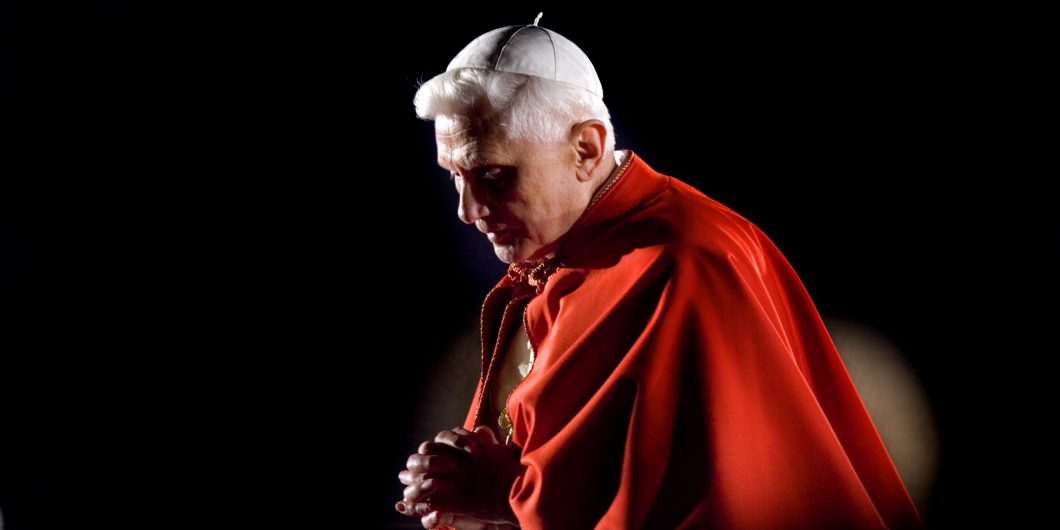Pope Benedict and the Drama of European Culture
Benedict XVI was an enormously gifted but truly humble human being: that oxymoron, a great Christian. Last week, he passed on to his eternal reward. In thinking about his life and now his death, I am reminded of what a Benedictine abbot once told me about his own saintly predecessor: the first week after his passing, we prayed for him, after that we began to pray to him.
While here on earth, Joseph Ratzinger was a great friend of human liberty and dignity. Characteristically, he argued that European culture had made invaluable contributions to them, but he feared they were radically imperiled by developments that also originated in the region of their birth. I would like to recall a few elements of this ambiguous position, first, to commemorate him, but more importantly to recall lessons he imparted which are worth remembering after his death.
The Cultural Framework
Among three fundamental ways of analyzing the human world (politically, economically, and culturally), Ratzinger was a decided cultural analyst. Naturally social, human beings from time immemorial had formed social groups knit together by shared experiences of the divine, the world, and man himself. These socially inscribed views and practices taught human beings what it means to live rightly. At their core was what C. S. Lewis dubbed “the Tao,” the conviction that there is an objective moral order in the world that is disobeyed at the sure cost of individual and social disorder, even destruction.
Culture, however, is not a matter of static acquisitions. Human imperfection and freedom do not allow for that. As groups journey through history, they encounter and jostle with each another, challenging and changing one another, sometimes dramatically. Biblical Israel’s history is particularly instructive in this respect: at its best, it protected its core views from foreign adulteration but also borrowed any number of cultural forms from the ambient cultures to better express its beliefs. Here was an early, and preeminent, form of cultural appropriation, one with divine approval. It is true that Israel’s history was also one of egregious failures in this regard, with idolatry a besetting temptation. The task was—and is—always exigent.
Given the original limits of every culture’s views, including Israel’s, cultural change was necessary and desirable. This exigence necessarily encountered resistance from elements in human nature—summed up by Ratzinger in the phrase “alienation from truth”—and from the requirements of social cohesion. What progress there was (and there was undeniable progress) was fraught and imperfect. Cultura semper reformanda. There is, however, a telos to the cultural interaction and development in history which gives ultimate meaning to the concept and reality of progress: a finally-come-together “mosaic” of the various human endeavors to grasp the full truth about God, the world, and man, purified and seen in their aboriginal orientation to and culmination in Christ and his multicultural body, the Church. However, for us the telos primarily exists as horizon and desideratum, one not subject to human will but to the design and good time of Providence. Thoughtful faith can know that it exists and even glimpse important aspects of its working out in history, but we never grasp it in its entirety.
From even this imperfect perspective, however, thoughtful faith can take the measure of human endeavors to immanentize the eschaton, a number of which were on display in the twentieth century. Among Ratzinger’s reasons for developing this culturally focused theology of history was to be able to critically evaluate them, as well as to help guide the contemporary Church in its earthy pilgrimage. In this, there are echoes of Augustine, but Ratzinger drew more explicitly from earlier Church Fathers such as Justin, Philosopher and Martyr, and Clement of Alexander. The significance of the appeal to and use of these early Church Fathers points to the decisive importance of Europe in the formation of the Church and the spiritual education of humanity.
Among humanity’s cultural formations, divine Providence bestowed on Europe a “world-historical privilege.” It was the pre-modern cultural formation that combined the final revelation of the Incarnate Word and his salvific message with the high development of human logos—reason and speech—in Hellenistic culture. In the context of imperial Rome, divine Ratio and philosophical reason encountered and engaged in a mutually beneficial (if often contentious) dialogue. This was the cultural foundation of the Europe that eventually emerged from the rubble of Rome. Ratzinger developed this thought in several places, most famously in his 2006 Regensburg Address. In it, however, he recounted not only a tale of cultural formation and fecundity, but of cultural deformation and unhingement as well. The subtitle pointed to a series of modern “dehellenizations” of Christianity injurious to both faith and reason.
The ultimate result was a new form of culture in Europe, which he calls by the ominous phrase “secular culture,” where the adjective bids fair to devour the substantive. In secular culture, not only the fruitful tension between biblical faith and philosophical reason animating previous European culture, but the lessons of “all the religious, all the historical, cultures” concerning the Tao, are rejected in principle, as modern European humanity undertook an unprecedented project: the emancipation and apotheosis of the human. Instead of the triptych God/world/man, Man in the majuscule was elevated over the world by way of technological science and God demoted to a matter for private piety or speculation, but with no presence in the public square. Here was a seismic reconfiguration of the public and the private. More deeply, or anthropologically, reason was redefined and reduced from being the divine spark to the restrictive canons of empirical science. Likewise, human freedom was cast in a canon of rights that lack mooring and are therefore susceptible to indefinite extension at the service of desire and demand. Encompassing and further justifying this configuration were new philosophies of History giving rise to distinctive social and political projects. After the collapse of one, that of Soviet Communism, Europe sought to adopt a new one.
In today’s politicized parlance, Ratzinger would be designated a “culture-warrior.” His life and thought show the limits and possibilities of the designation.
The Battle over Europe
As Benedict observed and tracked it, post-1989 Europe was the site of a fundamental struggle between the partisans of secular culture and those who favored some version of the older cultural arrangement, suitably chastened by the lessons of historical excesses and open to the best of modern secular thought. The former aimed to produce a new city of man on a continental scale, while the latter, including Benedict, argued that atheistic humanism diminished and eventually enslaved, rather than emancipated and elevated, man. European man, he recalled, was not simply a democratic atheist, he was also and more originally and authentically a believer open to philosophical reason and a proponent of philosophical reason open to and in dialogue with the tenets of faith. From their dialogue had come the great anthropological truths adopted first in Europe concerning human dignity, freedom, and equality before and because of God, entailing such precious moral tenets as conscience and its responsible freedom, the transcendent vocation of the human person, and hence the subordinate place and role of political authority in human society.
It was on the basis of this historical analysis that Ratzinger made regular interventions in the ongoing European debate over Europe. He analyzed the specific nature of “the state” and argued for its dependency on a cultural set of moral tenets that it cannot provide. Human equality, human freedom, and human dignity—presuppositions of the modern state—cannot be state-derived; they all need to receive their grounding, content, and limits from other, deeper sources. This is what culture provides, and what traditional European culture, with the choice fruit of the dialogue between biblical faith and philosophical reason, best supplies (again, appropriately updated: cultura semper reformanda).
Conversely, the twentieth-century unions of the state and various ersatz Religions of Man generated by modernity had shown themselves tyrannical and totalitarian. The same fate, predictably, awaits the ostensibly more “humanitarian” version of “secular culture”: Ratzinger could point to many episodes, some egregious, of active “cancel culture” in Europe. (These included the refusal to acknowledge the foundational contributions of Christianity to European identity in a proposed European Constitution, as well as the rejection of a Catholic philosopher, Rocco Buttiglione, as a suitable candidate for the European Commission.) My use of the American phrase “cancel culture” indicates that it is not just Europe that sees this sort of thinking at work. It therefore falls on all those throughout the west who love man, who love man because they love God, to resist this cultural juggernaut and to work for a culture and a politics more worthy of modern man, still God’s beloved, if especially errant, image. In the midst of today’s daunting challenges, the luminous writings of the deceased pontiff can continue to enlighten and encourage us in our own engagements with the hyper-partisans of modernity. I recommend three slim volumes of collected essays, Europe, Today and Tomorrow, Values in a Time of Upheaval and On Conscience, as good points of entry.
A Culture Warrior in Full
In today’s politicized parlance, Ratzinger would be designated a “culture-warrior.” His life and thought show the limits and possibilities of the designation. He always spoke with what he called “the serenity born of rationality,” but also a “reason illumined by faith.” He thus personally embodied the dialogue that he taught characterized Europe at its origin and its best, which needed to be recovered if Europe is to be fully itself. In the final analysis, however, it was his faith’s eyes on his beloved Lord that oriented and motivated his thoughts and actions.
Nietzsche said that Christian faith distracts man from this life, from love of the world. Ratzinger was a living refutation of that charge and canard. This important lesson he learned from Jesus Christ himself. But he also learned from him that this life, the world, and even culture point beyond themselves. That is why he wrote so much about liturgy. The root of culture is “cult” and, in the liturgy, the total reality of God and man, history and eternity, come together in the recapitulation of the paschal mystery. Having written so often and so well on it, having been daily nourished spiritually and intellectually by it, I have little doubt that he now enjoys it in its fullness.



